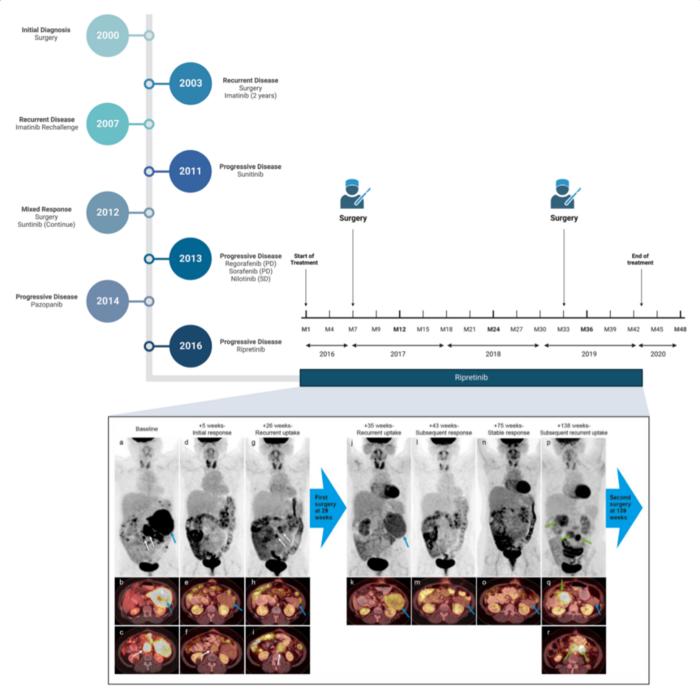“The patient was managed with ripretinib and surgical resection of progressing lesions at multiple time points which led to extended clinical benefit.”
BUFFALO, NY- November 3, 2023 – A new case report was published in Oncoscience (Volume 10) on September 20, 2023, entitled, “Multi-disciplinary management of recurrent gastrointestinal stromal tumor harboring KIT exon 11 mutation with the switch-control kinase inhibitor ripretinib and surgery.”
Ripretinib is a tyrosine kinase inhibitor that was approved by the United States FDA in 2020 for treatment of advanced gastrointestinal stromal tumor (GIST) in patients who received prior treatment with three or more tyrosine kinase inhibitors.
In this new case report, researchers Mohamed A. Gouda, Filip Janku, Neeta Somaiah, Kelly K. Hunt, Sireesha Yedururi, and Vivek Subbiah from The University of Texas MD Anderson Cancer Center and Sarah Cannon Research Institute described the use of ripretinib in a patient with recurrent GIST harboring a KIT exon 11 mutation following treatment with multiple TKIs. The patient was managed with ripretinib and surgical resection of progressing lesions at multiple time points which led to extended clinical benefit.
“[…] we show the durable clinical benefit achieved in a patient with GIST by using ripretinib and repeated timely surgical resection of limited disease progression.”
A Hispanic female in her late 20s presented with left lower quadrant pain initially attributed to an ovarian cyst. A workup with computed tomography (CT) evaluation, revealed an incidental 6 cm duodenal mass with central necrosis. She underwent exploratory laparotomy with resection of the mass which was diagnosed as GIST with high malignant potential and positive immunohistochemistry for c-KIT. The total time on ripretinib was 43 months which is longer than the current reported data from ripretinib clinical trials.
“Such an approach for using multi-disciplinary disease management can improve the durability of response to tyrosine kinase inhibitors, including ripretinib, and associated clinical outcomes.”
Read the full paper: DOI: https://doi.org/10.18632/oncoscience.586
Correspondence to: Vivek Subbiah
Email: vivek.subbiah@scri.com
Keywords: ripretinib, precision oncology, sarcoma, surgery
About Oncoscience:
Oncoscience is a peer-reviewed, open-access, traditional journal covering the rapidly growing field of cancer research, especially emergent topics not currently covered by other journals. This journal has a special mission: Freeing oncology from publication cost. It is free for the readers and the authors.
To learn more about Oncoscience, visit Oncoscience.us and connect with us on social media:
- X, formerly known as Twitter
- YouTube
For media inquiries, please contact media@impactjournals.com.
Oncoscience Journal Office
6666 East Quaker Str., Suite 1D
Orchard Park, NY 14127
Phone: 1-800-922-0957, option 4
###
Journal
Oncoscience
DOI
10.18632/oncoscience.586
Method of Research
Case study
Subject of Research
People
Article Title
Multi-disciplinary management of recurrent gastrointestinal stromal tumor harboring KIT exon 11 mutation with the switch-control kinase inhibitor ripretinib and surgery
Article Publication Date
20-Sep-2023
















